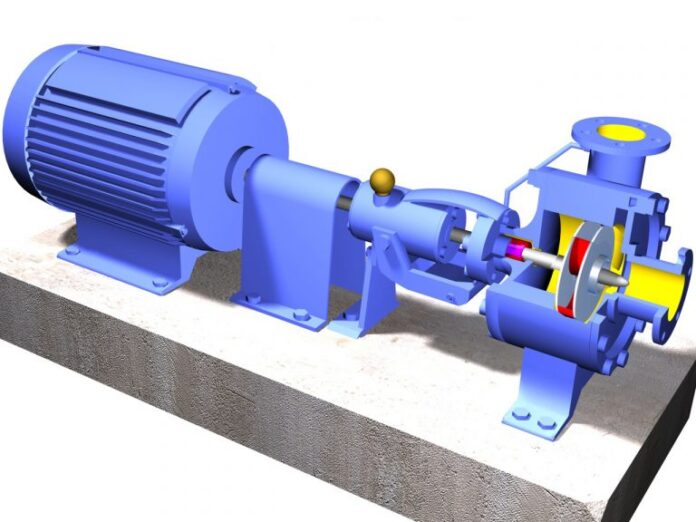There are a few popular different types of pumps, each with its specific purpose. The most commonly known type of pump is the centrifugal pump, which uses a rotating impeller to actively draw water into the pump and then pushes it out. These pumps are typically used for irrigation, water treatment, and industrial applications.
Another common type of pump is the positive displacement pump, which moves water by trapping a limited amount of water in a chamber and then moving that chamber to discharge the water. These water pumps are often used in residential settings to boost water pressure or transfer water from one location to another.
Finally, there are submersible pumps designed to be submerged in water. These pumps are typically used for draining floodwater or removing water from wells.
SUBMERSIBLE PUMP
A submersible pump is hermetically sealed so that the motor and other parts are protected from the water.
There are two main types of submersible pumps: centrifugal and positive displacement. Centrifugal submersible pumps use the force of moving water to create a centrifugal force that spins an impeller and then moves the water through the pump. Positive displacement submersible pumps work by trapping a certain amount of water and then moving it through the pump using a piston or other mechanism.
Submersible pumps are typically made of stainless steel or other corrosion-resistant materials, as they will always be in contact with water. They can also be made with plastic components in some cases. The motors of submersible water pumps can be either AC or DC power sources.
JET PUMP
Jet pumps move water from one place to another and use a jet of water to create suction. Jet pumps can be indeed used to pump water from a well, or they can be used to transfer water perfectly from one tank to another. Jet pumps are also often used in irrigation systems.
SPOTTING ISSUES
By recognizing the signs of trouble in your pump, you can take steps to prevent further damage and keep your home or business safe. Here are four signs that there may be a problem with your water pump:
1. Leaks
If you currently notice any leaks coming from your pump, it is a sign that there is a problem. Leaks can lead to decreased water pressure and pump failure.
2. Noisy Operation
If your pump is making unusual noises, it could be a sign of a problem. Unusual noises indicate that the pump is not operating correctly and needs to be repaired or replaced.
3. Decreased Water Pressure
If you notice a decrease in pressure from your pump, it could signify a problem. Leaks, clogs, or other issues can cause a decrease in pressure. If you currently notice a decrease in water pressure, you should contact a professional to check your pump and make the necessary repairs.
4. Pump Failure
If your pump stops working altogether, it is a sign of serious trouble. Pump failure can cause flooding and other damage if not addressed immediately. If your pump fails, you should contact a professional for repairs or replacement as soon as possible.
CONCLUSION: CARING FOR YOUR PUMPS
1. Check the alignment of your pump regularly. Misaligned pumps can cause undue wear and tear on the pump and may eventually lead to failure.
2. Inspect the casing of your pump for cracks or damage. If you notice any damage, have it repaired immediately to prevent further issues.
3. Keep an eye on the level of lubrication in your pump. Lubricated pumps will last longer and run more efficiently.
4. Change the oil in your pump regularly according to the manufacturer’s recommendations. This will help keep your pump running smoothly and prevent premature wear.
5. Make sure the area around your pump is clean and debris-free. A clean environment will help extend the life of your pump and keep it running correctly.


